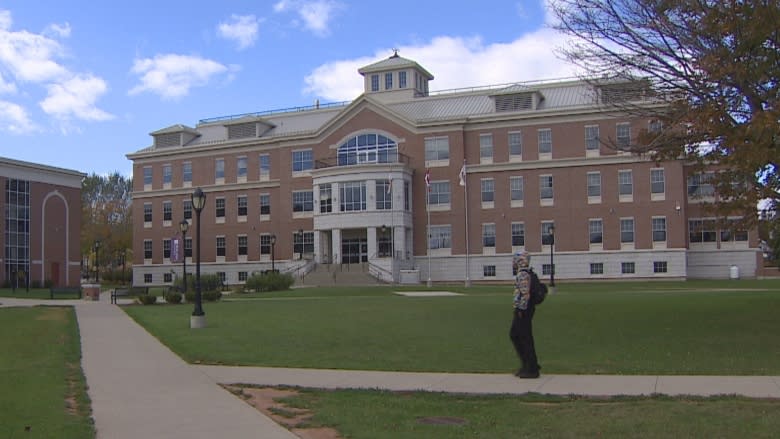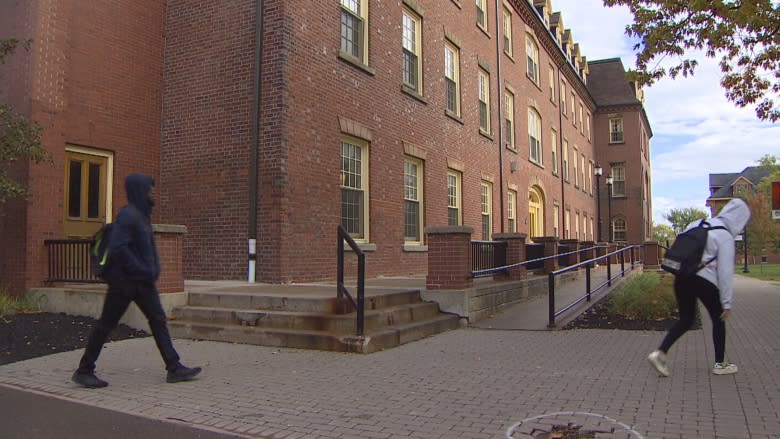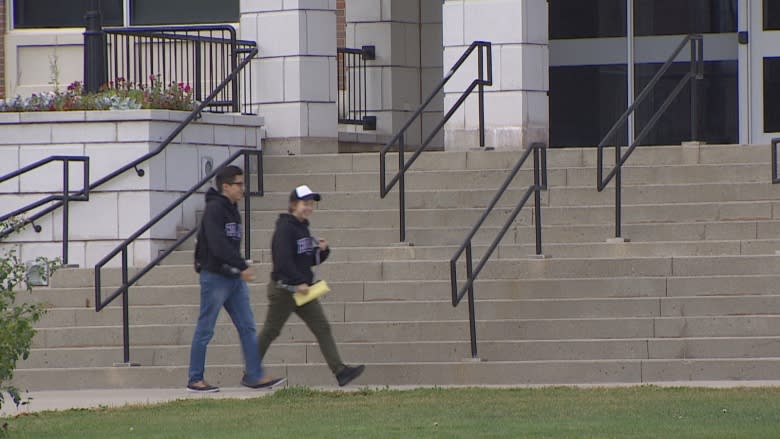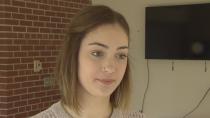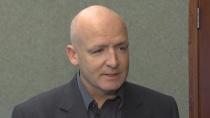Beating back student loans: Repayment options making a difference, students say
New programs that offer more options for graduates to pay off their provincial student loans are working, say provincial officials and the student unions at UPEI and Holland College.
The changes were made to address a growing number of loans in default.
Rising tuition, textbook and cost of living costs are seen as partly to blame for mounting student debt, along with increased difficulty in securing full-time, well-paying jobs after graduation.
"It does take them longer than expected to find that job," said Aaron Lawlor, manager of Student Financial Services with the Department of Education. "A lot of them are out on their own for the first time and it's a lot to juggle."
"They're just not where they hoped to be. We brought in some of these programs to alleviate that pressure," he added.
'A huge concern'
The province estimates the average student loan debt in the high $20,000s.
A 2014 survey at UPEI pegs the overall student debt much higher — about $36,000 — 33 per cent above the national average.
"It's certainly a huge concern," says Taya Nabuurs, UPEI Student Union's vice-president academic and external. "We're noticing students are having trouble post-graduation entering into the workforce, finding gainful employment where they have significant wages to be able to pay down that debt."
Greg Gairns, general manager of the Holland College Student Union says a debt of $20,000 to $30,000 upon graduation is not uncommon. "It's setting them back right away for when they enter the workforce."
In 2016 1,464 students on P.E.I. got provincial student loans worth a total of $5,394,745.
The same year, 1,549 Island students received federal student loans, worth $17,739,217. Many students get both levels of loans.
Student Financial Services on P.E.I. disburses the federal and provincial loans, but only oversees the provincial portion of those loans that are in default. There are federal programs to help with repayment of Canada Student Loans.
Payment relief
A major change in loan repayment on P.E.I. came in the spring of 2016. Students used to have to make their first payment six months after finishing school.
Now they have 12 months to start making payments.
Under another program called Payment Relief, a graduate can apply to skip making payments for six months, up to five times. A family of four with income of $48,000 for example would be exempt from making payments.
"It's a huge benefit for the students," said Gairns. "Not to have that stress right as soon as they graduate."
In addition, the province cancels loans of students who have a severe permanent disability that prevents them from pursuing further post-secondary education or getting full-time work.
And students who graduate with more than $6,000 in federal and provincial student loans a year can apply for a grant of up to $2,000 a year to reduce their loan balance.
"These are all excellent initiatives, especially in terms of extending the repayment period to a year. It gives students the extra time that they're really needing right now to find that employment to pay down that student debt," said Nabuurs, who's hearing from students that the increased options are making a difference.
Growth of defaulted loans halted
When students fall behind for a total of nine months of payments, they're considered in default.
The province is managing a total of 1,474 defaulted loans right now, worth more than $9 million, said Lawlor.
The balance of defaulted loans had been growing over the past five years, but this year that outstanding balance has started to drop as has the number of new cases that go into default.
In July 2013, for example, 193 loans went into default, but this year that number was down to 135.
"We do see that the defaults for student loans are decreasing over the last couple of years so that gives us a bit of comfort that we're going down the right road with the programs we're offering," said Lawlor.
The road to default
While most students do repay their loans, about 10 per cent of graduates struggle to make their payments and there are many reasons why they go into default.
It can take some students years to finish their education and find full-time work in their field, he said, or they may have been in a relationship that broke up, and are left juggling how to pay expenses with a single income. Paying for shelter, food and clothing may take on more of a priority than paying off a student loan.
The worst case Lawlor has seen was about $100,000 in provincial and federal loans.
Rehabilitation Program
Those in default are charged prime interest plus two per cent (currently about 5.2 per cent), the Canada Revenue Agency withholds their GST and income tax refund and it's applied to their loan, and being in default can hurt a graduate's credit rating for several years, a hindrance if they want to borrow money in the future.
Under the Rehabilitation Program, introduced late in 2015, once a graduate starts making payments again, all those negatives are eliminated after six months.
"We'll set their interest rate back to zero per cent and suspend any outstanding interest," said Lawlor. "So that means any payments they make will go strictly towards their principal and ultimately we would forgive that outstanding interest."
Since the program started the province has rehabilitated 128 loans worth about $720,000.
Advocating for more change
Student unions though, are advocating for more changes.
Nabuurs would like to see more opportunities for co-operative and internship experiences to give students work experience and make connections with potential employees.
In addition, under a recently expanded program that allows students to collect Employment Insurance while at college or university, students in Charlottetown have to work more hours to qualify, than those in the rest of the province — 665 hours compared to 420, or 16.6 weeks compared to 10.5. Nabuurs would like to see that equalized.
Her union would also like to see the province stop linking family income to a student's eligibility for a loan.
"There are parents for a number of reasons who aren't able to contribute to their student's education, regardless of their family income. So we're seeing a lot of students who are rejected from being able to get student loans and get that help that they need," said Nabuurs.
Gairns agrees. "If they choose to get a student loan they'll be living with that student loan" after graduation he said, so what their parents make shouldn't be a factor.
Mature students
He'd also like to see more supports for mature students returning to school.
"It's very stressful to come back here after being away but especially when you have a family and you have to continue to provide for your family when you're back at school."
Holland College does offer students advice on how to budget when they're at school, but Gairns thinks a program to help students with budgeting after graduation could put them in a better situation to repay their student loan.
"Not every student is lucky enough to have that skill set right away," he said.
- MORE P.E.I. NEWS | Veterinarian shaving her head for Humane Society
- MORE P.E.I. NEWS | The babies are big, the mothers are young: Facts about birth on P.E.I.

